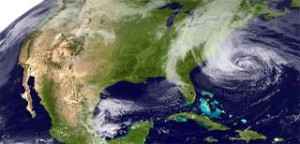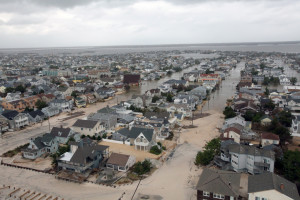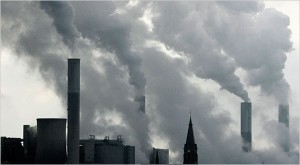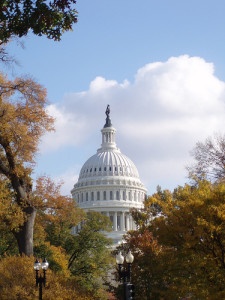We have much more to do and your continued support is needed now more than ever.
The Public Is Speaking: Action on Climate Change Now
 New NWF post-election polling shows that the realignment of our politics around the issue of climate continues to gain steam. Conducted by Zogby Analytics, the new polling shows that as more and more Americans see the impacts of climate-fueled extreme weather hitting close to home, their concern over the issue of climate change continues to grow. And with that rise in concern, it is clear that voters of political stripes expect their elected officials to act now to address the climate crisis.
New NWF post-election polling shows that the realignment of our politics around the issue of climate continues to gain steam. Conducted by Zogby Analytics, the new polling shows that as more and more Americans see the impacts of climate-fueled extreme weather hitting close to home, their concern over the issue of climate change continues to grow. And with that rise in concern, it is clear that voters of political stripes expect their elected officials to act now to address the climate crisis.
Let’s take a look at these new results:
Climate Had a Role in Superstorm Sandy
Q: Do you think climate change is adding to the severity of recent extreme weather such as Superstorm Sandy and the summer droughts?
57.2% Yes 27.9% No 14.8% Not Sure
Deeper Dive: Superstorm Sandy impacted the public across the country not just in the Northeast. At least 54% responded “Yes” in each region of the country (East, South, Central/Great Lakes & West). According to veteran pollster John Zogby:
These results show the dramatic impact 2012′s extreme weather has had across party lines, with half of Republicans, 73 percent of independents and 82 percent of Democrats saying they’re worried about the growing cost and risks of extreme weather disasters fueled by climate change. It’s a major change from our December 2009 poll, which showed two-thirds of Republicans and nearly half of political independents saying they were ‘not at all concerned’ about global climate change and global warming. The political climate has shifted and members of Congress need to catch up with their constituents.
69% Concerned Over Costs & Risks of Climate Change

- 22.3% I am worried a great deal
- 46.7% I am somewhat worried
- 15.9% I am not very worried
- 11.3% I am not worried at all
- 3.8% Not sure
Deeper Dive: Concern over climate fueled extreme weather spans the political spectrum. 58% of those sympathetic to the Tea Party are greatly or somewhat concerned about climate change. 82% of those sympathetic to Occupy Wall Street are concerned.
More Than 65% Want Elected Officials to Act Now to Address Climate Change
Q: Do you believe elected officials should take steps now to reduce the impact of climate change on future generations, or wait until there is more evidence?
-
65.3% Take steps now
-
27.3% Wait until there is more evidence
-
7.3% Not sure
Deeper Dive: The call for action from elected officials spans across all generations. 74% of those in the age group 18-29 say take steps now; 68% in the age group 30-39 want action; 64% of those between 50-64 years old want action; and 52% of 65+ say take steps now.
Don’t Roll Back the Clean Air Act
Q: Which of the following proposals offered by candidates do you think should be the highest priority to help solve America’s energy challenges?
A: When given a number of choices, only 3.5% wanted to “relax clean air standards to promote more electricity from coal.”
Deeper Dive: In comparison, 38% want political leaders to do more to encourage the development of renewable forms of energy like wind and solar power. This choice had more than double the support of any other choice.
Voters Are Tired of Polluters Trying to Influence Elections

- 41.7% Very concerned
- 35.1% Somewhat concerned
- 14.2% Not very concerned
- 4.6% Not at all concerned
- 4.5% Not sure
Deeper Dive: The concern over polluter contributions spans the political spectrum. 81% of Democrats, 70% of Republicans and 77% of independents are very/somewhat concerned about the role of polluter money in campaigns.
Ignoring the Call for Climate Leadership
The polling results as a whole continue to show that a failure to lead or take action on climate will put political leaders at odds with the public. And while this is true across the political spectrum, after the election some political leaders are not getting the message.
 House Majority Leader John Boehner has once again decided to hide behind the phony debate over climate science. Responding to question about climate he said:
House Majority Leader John Boehner has once again decided to hide behind the phony debate over climate science. Responding to question about climate he said:
“I don’t think there’s any doubt that we’ve had climate change over the last 100 years. What has initiated it, though, has sparked a debate that’s gone on now for the last 10 years. I don’t think we’re any closer to the answer than we were 10 years ago.”
Similarly, House Energy & Commerce Committee Chairman Fred Upton was asked whether he would consider a carbon tax as part of the fiscal cliff negotiations and responded, “I don’t like the idea.” Let’s remember that Congressman Upton has also opposed the Waxman-Markey Cap and Trade legislation and last Congress led legislative efforts in the House to strip the EPA of its authority under the Clean Air Act to deal with carbon pollution. All of which means that the Congressman is running out of options to support that will actually tackle the climate problem.
This lack of leadership on climate is woefully out of alignment with where voters are after Superstorm Sandy and the recent election. It is past time for of our elected officials of all strips to look to the future: whether for the sake of addressing the growing impacts of climate change or even if it is for their own political future.




















